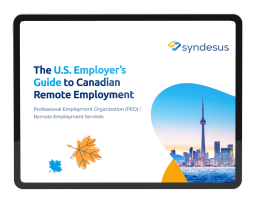Despite almost constant access to digital connectivity — at work, at home, and on the go via our mobile phones — many employers may hadn’t considered offering a remote work option… until they had no choice last year.
The pandemic forced a majority of workers out of the office, and in 2020, a whopping 71% of full-time employees worked from home.
But even before the pandemic, some companies took the work from anywhere trend to the extreme by eliminating offices.
Companies like GitLab, Zapier, and Buffer have fully remote teams that are distributed across the world.
Plenty of companies have found success with remote work policies before the pandemic, and now, even more, are realizing that the work from anywhere trend might not be just a trend — it’s a policy that works!
So, what does this mean for workers?
Work from anywhere policies gives tech workers the flexibility to work for a US-based company while living potentially anywhere in the world, including the beautiful Canadian Rockies, countryside, and more.
If you’re looking for a little adventure and want to see where your geographic freedom can take you, here’s everything you need to know about the work from anywhere revolution, where in the world you can live and work, and how Syndesus can help you achieve that in Canada.
What is Work From Anywhere?
The policy goes by many names, such as remote work, work from home, or work from anywhere. Whatever you call it, the idea is the same: Workers are given the flexibility to choose where they work, whether that be from an office, a cafe, the comfort of their couch, or a beach in Bali.
For workers, the benefits of geographic flexibility are an increase in freedom of movement — live and work where you want — and an improved work/life balance.
These policies look different for every workplace.
Some employers are adopting a hybrid model which sees workers in the office two days a week and at home three days a week. Some want their employees to stay in the same country or time zone as the office, while others don’t care where you are as long as you’re getting your work done.
The work from anywhere model offers plenty of benefits to both workers and employers.
The biggest financial perk for companies is the reduced or eliminated real estate costs. Companies are also likely to see a boost in their workforce.
Not only does a work from anywhere policy allow companies to cast a global net when hiring new talent, but their employees are also likely to see an increase in productivity while working from home.
For workers, the benefits of geographic flexibility are an increase in freedom of movement — live and work where you want — and an improved work/life balance.
Did you know that the average American commute in 2019 was 27 minutes each way?
That’s almost 200 hours you spend each year going to and from work.
Something as simple as skipping the commute reduces stress and increases time spent on personal things, like spending more time with your kids. When employees have the flexibility to take care of personal obligations, they are happier and more productive.
Working from anywhere seems like a win-win, right?
Well, there’s one big downside to the arrangement: the risk of workers feeling isolated away from their colleagues. Fortunately, there’s a solution to this problem.
Canada is home to many co-living communities for digital nomads and remote workers
Remote work has plenty of benefits, but there are serious concerns about how working from anywhere affects communication, brainstorming, and social interaction.
Sure, Slack, email, and other tools can connect colleagues all over the world, but what about the emotional aspect of remote work?
These communities can be found around the globe and take many forms, such as modern apartment buildings or no-frills beachfront hostel-like spreads.
Co-living might be the solution for remote workers seeking a place to both live and work remotely while reducing the risk of worker isolation.
Real estate companies have been promoting co-living as a cost-effective housing option in growing urban populations. These arrangements usually offer residents fully-furnished rooms or small units with common living areas and amenities.
For some, it’s simply a cheaper way to live, but for others, digital nomad communities are places to live, work, and connect — both digitally and personally.
These communities can be found around the globe and take many forms, such as modern apartment buildings or no-frills beachfront hostel-like spreads.
But for US-based tech workers, Canada might be one of the best options.
Here are some co-living communities in Canada you should check out.
- Big Calm is a community of tiny houses on wheels parked on a 37-acre plot of land in British Columbia. The community was founded with digital nomads in mind as the ultimate regenerative remote work-life environment. The rent that remote workers pay covers their tiny house, internet, utilities, and access to shared amenities. The idea of Big Calm is to stay connected with the option to unplugged with nature when needed.
- Another Canadian co-living community is Nomad Coliving in Montreal. This community was founded by Montreal-based digital nomads for local and international entrepreneurs, freelancers, and remote workers looking for flexible housing options. Residents are selected through an application process, and if chosen, digital nomads can stay for one to six months.
- The final Canada-based co-living community I’ll mention is Node, a co-living real estate company that has raised hundreds of millions of dollars for its expansion. Node’s communities include creatives, tech-savvies, and entrepreneurs living in New York, Dublin, London, and Los Angeles. Node recently expanded into the Ontario tech hub of Kitchener-Waterloo with plans to continue growing in Canada, including Toronto.
As you can see, you’ve got options. Instead, new work from anywhere policies encourage you to explore Canada…as long as you have a solid internet connection.
Moving to a digital nomad co-living community in Canada is easy! Here’s how you do it.
Remote work existed before the pandemic, but 2020 ushered in a true work from anywhere revolution.
Companies once reluctant to adopt remote work are seeing the benefits — lower real estate costs, access to global talent, and huge productivity gains.
And while workers must learn to communicate with their teams from afar, they are now enjoying geographic flexibility.
If you could work from anywhere in the world, where would you work? Consider co-living and co-working remotely in Canada!
Syndesus takes care of the legwork while you get to live a dream life in Canada and your employer keeps you with the company
And if the process seems overwhelming, don’t worry it’s quite easy to stay with your current US employer and work remotely for them from Canada.
If your company doesn’t have a Canadian office, that’s okay. Working with a Canadian Professional Employer Organization (PEO) is your answer.
A Canadian PEO acts as your legal employer of record in Canada, taking care of the legal, HR, and payroll aspects of your employment while your current US employer still pays your salary, directs your work, gives you stock options, and more.
This is what Syndesus does – as a Canadian PEO, we help US tech companies hire workers remotely in Canada. Syndesus takes care of the legwork while you get to live a dream life in Canada and your employer keeps you with the company.
Plus, Syndesus helps facilitate the immigration process too, with our network of Canadian immigration attorneys.
So if you’re a US-based tech worker and you’d like to live in Canada, Syndesus can also help you apply for a Canadian visa, relocate to Canada, and continue to work for your American company.
We take care of the back end while you and your company get to enjoy the benefits and flexibility of the new work-from-anywhere world.
Want to hear more? Book a consultation to chat about your career and goals.









